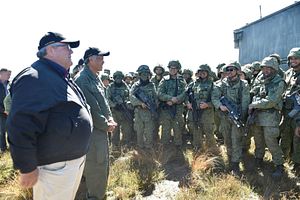Though the Asia-Pacific faces a range of security challenges, from lingering territorial disputes to cyberattacks, the threat of terrorism has been looming ever larger with the rise of the Islamic State (ISIS). This is particularly the case as intensifying U.S. efforts against ISIS in the Middle East increases the likelihood that other regions may become either a new home for ISIS recruits or an alternative target for attacks (See: “ASEAN’s Islamic State Conundrum”).
While it is not often in the spotlight relative to Southeast Asian states or even neighboring Australia, New Zealand too recognizes the magnitude of the terrorism challenge. Officials realize that even though there has yet to be a major terrorist attack in the country, Wellington is not immune from the impact of radicalization, and that it needs to be working on a series of domestic and international measures in concert with regional partners to address the challenge.
That was in the headlines over the past week with the visit of New Zealand’s Attorney General Chris Finlayson to Singapore and Malaysia. Finlayson, who also minister in charge of the New Zealand Security Intelligence Service and minister responsible for the Government Communications Security Bureau (GCSB), was also accompanied by New Zealand’s ambassador for counterterrorism, Carl Worker.
The logic behind Finlayson’s selection of Singapore and Malaysia as the two legs of his trip is clear. These are two of the more forward-leaning Southeast Asian states on counterterrorism, as evidenced by the fact that they are the only countries from the region that are part of the U.S.-led Global Coalition to Counter ISIL. More broadly, within ASEAN, Singapore and Malaysia are among New Zealand’s closest partners on the defense side, with a relationship dating back decades when they were members of the 1971 Five Power Defense Arrangement, which also included the United Kingdom and Australia.
As Finlayson had indicated ahead of his trip, the engagements included a series of ministerial meetings about security issues, including counterterrorism. In Singapore, he had a series of meetings including with the minister for home affairs and the attorney general and chief justice.
As I have indicated previously, Singapore has long been positioning itself as a key player on counterterrorism in Southeast Asia. The city-state has begun undertaking a series of domestic initiatives, with recent steps including forming high readiness task forces to quickly respond to terror threats and developing joint operational commands to boost interagency cooperation. It has also been working more with regional and international partners, from sharing expertise on deradicalization to contributing more to the global fight against the Islamic State (See: “Strengthening US-Singapore Strategic Partnership”). Singapore has also been looking to broaden and deepen its defense relationship with New Zealand in particular across a range of areas (See: “Why is Singapore Eying a Military Base Deal With New Zealand?”).
The Malaysia leg of the visit also consisted of a series of high-profile meetings, including with Deputy Prime Minister and Minister of Home Affairs Ahmad Zahid Hamidi. Following the meeting, Finlayson reportedly expressed interest in learning from Malaysia’s efforts at counterterrorism and deradicalization along with its experience in other areas like countering cyber crime.
That should come as no surprise considering the priority Malaysia has attached to addressing the terrorism challenge. That has included working more with partners as evidenced by cooperation with the United States (See: “US, Malaysia and the War Against the Islamic State”). This year also presents an opportunity for Malaysia and New Zealand in particular to increase cooperation across a range of areas, including the defense side, since they are commemorating the 60th anniversary of the establishment of their diplomatic ties.
Unsurprisingly, Finlayson did not disclose many details about the sensitive subjects that were discussed. Nonetheless, given that the threat from the Islamic State shows few signs of disappearing anytime soon, it will be interesting to see how collaboration between Wellington and these two Southeast Asian states on counterterrorism progresses.
































